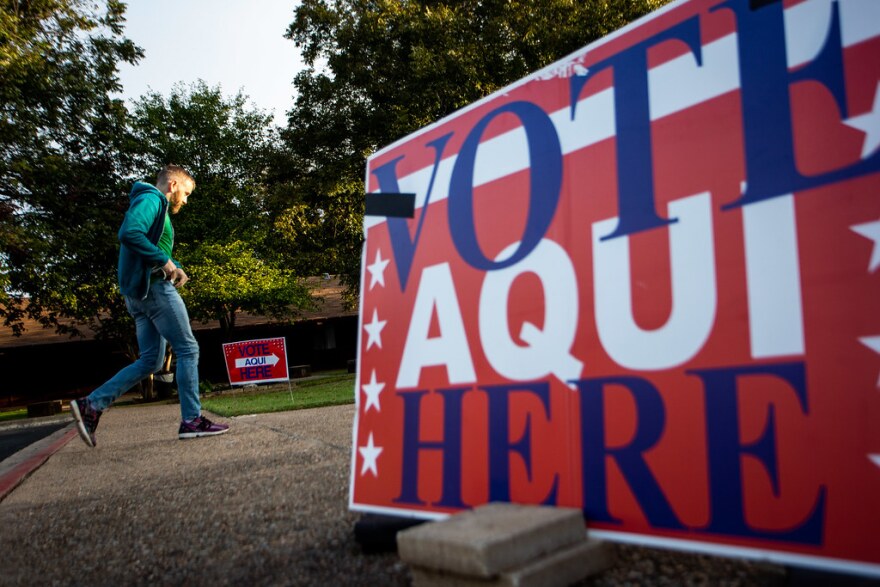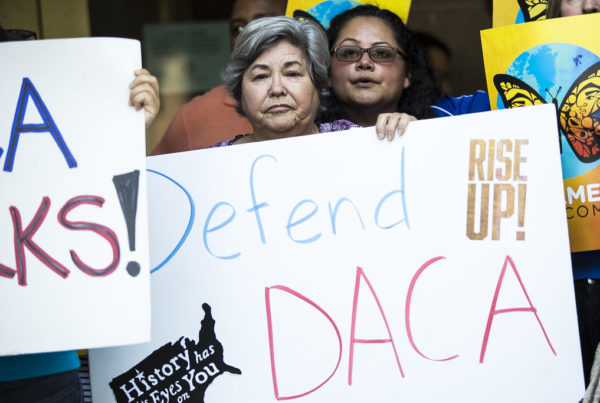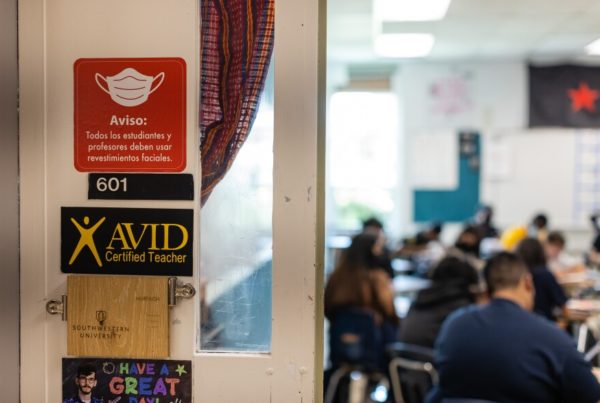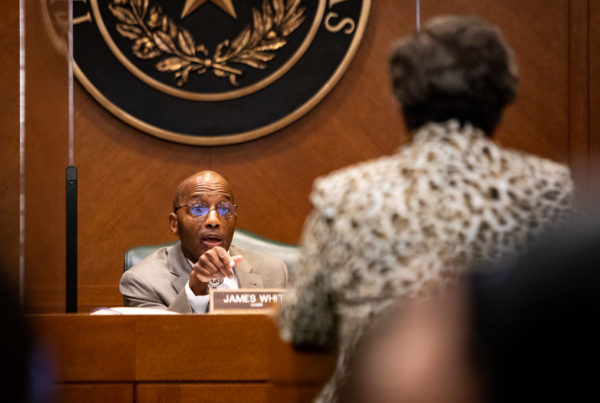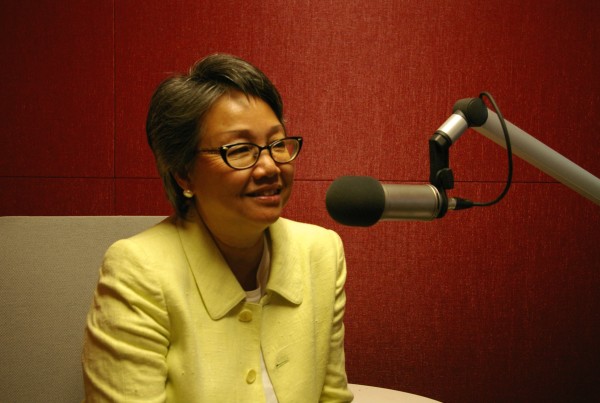With a major election just three months away, the entire elections staff in Central Texas’ Gillespie County quit last week. Why? The former staffers say they faced harassment, bullying and death threats. But Gillespie isn’t the only county where complaints are frustrating election workers.
Published reports say it comes down to a fundamental shift in the tone of politics that has led to a rise in misinformation, threats, intimidation and burnout. Sam Taylor is spokesperson for the secretary of state – the official charged with overseeing elections in Texas. Taylor says the amount of turnover among election officials has increased since the 2020 election, though that increase includes retirements and leaving due to low pay. Listen to the interview above or read the transcript below.
This transcript has been edited lightly for clarity:
Texas Standard: That story of the election official in Gillespie County and the election staff resigning over death threats and harassment was very eye-opening. Would you say that the amount of turnover of elections officials has risen in recent years?
Sam Taylor: We’ve seen about a 30% turnover just in the past two years since the 2020 election. Going back further than that, we don’t have a lot of data on whether or not that’s higher or lower than average. But it’s not surprising that a lot of people are deciding to get out of the elections game now because there’s natural retirement. There’s also, like you mentioned, a heightened, scrutinized political environment that is just resulting in a lot of burnout from local election officials. So, quite frankly, not too surprised that folks are deciding to leave. It’s just concerning when folks leave right before a major election like this.
I think that it’s concerning whenever someone receives threats or possible political intimidation. And that’s something that we’ve been hearing a lot from elections officials, not just in Gillespie County, but talking with the folks over at the Texas Association of Elections Administrators, they say that this is something that’s happening statewide due to the stress of the job, new requirements, new laws that they have to oversee that have been put in place in recent legislative sessions. Are you having to field some of these and the secretary of state’s office or or how are you advising officials when staff members start to leave?
First of all, if anybody receives any threats on their lives, on their safety, we encourage the local officials to report those immediately to federal law enforcement or state law enforcement. We’ve got contacts with the FBI. We’ve got contacts at the Texas Rangers and Department of Public Safety, who we refer them to immediately. If so, they can report those threats to them.
But in the Gillespie County situation, we actually have had to step in before and train employees and make sure that they are up to date on all the new election laws. So in the case of Gillespie County, it was three employees, the EA [elections administrator] and her two deputies. They all resigned last week. And we are going to be sending trainers to Gillespie County to train county employees who have worked elections before, albeit they are in the county clerk and tax assessor collector’s office. So they haven’t run elections in a few years. So they’re going to have to get caught up pretty quickly on all the new election laws. And there were quite a few changes the legislature made last year.
But I think the good thing about those changes are that there’s a lot of new transparency measures in the election law that help bring more confidence to the election system. You’re not going to convince everybody that elections are fair and secure, but at least you can help inform the public a little bit more and show them all of the safeguards and all of the processes in place to ensure that the count is accurate, that elections are run fairly with integrity and in accordance with the law.
Well, now you talk about the transparency. Could you give us an example of what you’re referring to?
Absolutely. So SB 1 required something called the reconciliation form, and the reconciliation form is required to be filled out after all the votes are counted on election night to show how many people cast ballots, versus how many ballots were counted. Ideally, it should match exactly. If there’s any discrepancy between that number. It allows county election officials to catch that, go look back at their records and make sure that they can account for every single ballot that was cast. And then they have to do that again after the final canvass of votes. That usually happens about seven days after Election Day when all the military and overseas mail ballots come in. So that tool alone has been a very useful tool for transparency and has been able to allow county election officials to show their work, so to speak. To the voters to show that all of the election records can be accounted for, that they can be reconciled, and hopefully give voters a little bit more confident that there aren’t ballots out there that either were thrown away or haven’t been counted. And it helps kind of decrease the suspicion that there was fraud or malfeasance that went on in the election.
Having the county judge and the clerk and tax assessor staff trying to deal with elections is far from an optimal position and it’s not really sustainable, I would imagine. And I’m wondering what, if anything, can be done from the secretary of state’s office to try to ensure that people who are working these positions feel at a minimum safe, but of course, at the same time trying to reassure voters that their votes are being properly counted.
My message and our message to all Texas voters is that Texas elections have never been more secure. They’ve never been more transparent. And I think we’re very proud of the way that we’ve advised counties and trained counties on how to deal with these new requirements and how to be transparent with their voters. But beyond that, really, it’s a county responsibility to make sure that these election officials are getting the resources and the support that they need. Folks remember their teachers and their firefighters and their local policemen, but they don’t often remember their elections administrators. I think they should. I think these are public servants that have a huge impact on your everyday lives. So we’re really encouraging county officials to work with us. And we’ve got trainers that are coming out there to help them run their elections. We can’t run the elections for them, but we can help make sure that all the staff at the county level have the training that they need to run a fair election. Because when you’re new, when you don’t have as much experience, chances are mistakes can happen. They can be innocent mistakes. But unfortunately, these days, an innocent mistake is sometimes interpreted as fraud or illegal activity. So what we’re trying to do is minimize those mistakes as much as possible and give county officials the training that they need to run a clean, smooth election.
When you’re trying to deal with combating misinformation, which seems to be at the root of a lot of these threats and accusations and allegation, the pressure that a lot of eyes report when you’re dealing with that level of misinformation, disinformation, how do you push back against it?
Really, you’ve got to be proactive about it. You’ve got to be proactively educating people about the process. Elections for a long time has been sort of a black box, especially since 2002. The Help America Vote Act required electronic voting systems in pretty much every jurisdiction. So for years, probably about 20 years, elections have been this kind of mystified, mysterious process that not a lot of people understand. So the more that we can demystify the process and put out information, explainers work with county election officials to show the public how voting machines work, how voting systems work, what chain of custody measures go into transferring all of the ballots from the time that you vote it to the time that it is counted at the county central count location. That’s the kind of education we’re trying to do on the front end so that there is we can demystify the process of elections and give folks more transparency, an insight into how they work. And I think once folks see all of the things that go into every single election, first of all, they’ll be amazed. Second of all, they’ll feel a lot better that their vote does count.
Does something need to be done more broadly – perhaps greater protections in the law for election administrators? Is there a way of dealing with the threats and intimidation which seem to me making this job untenable for so many
That’s really a decision for the Legislature to make and for county officials themselves at the local level to make in terms of how they can give more resources to protect those local election officials and make sure that that those threats are not acted on, if reported immediately. But really, it might be a matter of the legislature updating the laws and creating higher penalties for folks that do threaten public officials like that. I’m sure that’s something that the Legislature would like to look into next session, and we’re ready to provide information on exactly what the threat environment is, both on our office because our elections division gets threats as well and local election officials.
Sam, how concerned are you about the status of these election officials and the threats that they’re reporting?
My biggest concerns are twofold. Number one. Threats like these are going to drive away the very people that we need right now to instill greater confidence in our election system. There are people out there that don’t trust the elections. And whenever you have people fleeing election offices like this, it’s going to leave less people that are qualified to do the work and run a clean election. More likely that you’re going to have mistaken and it’s just going to snowballed from there. And then number two, the other concern I have is that sometimes things like this discourage voters from going to the polls. If you don’t think that your elections are secure or you think the elections are rigged or you think that something is going wrong illegally in the election, then you’re going to be less likely to come out to the polls. So I’m really concerned about the long term and, you know, really even short term effect that this is going to have on both people who work the polls and people who go to the polls.


